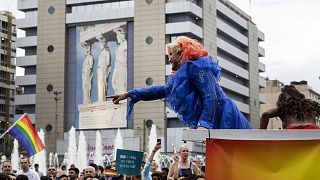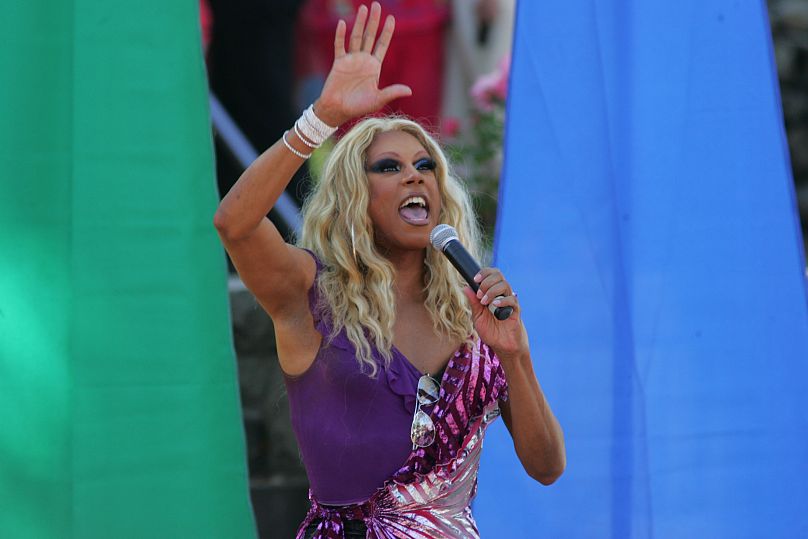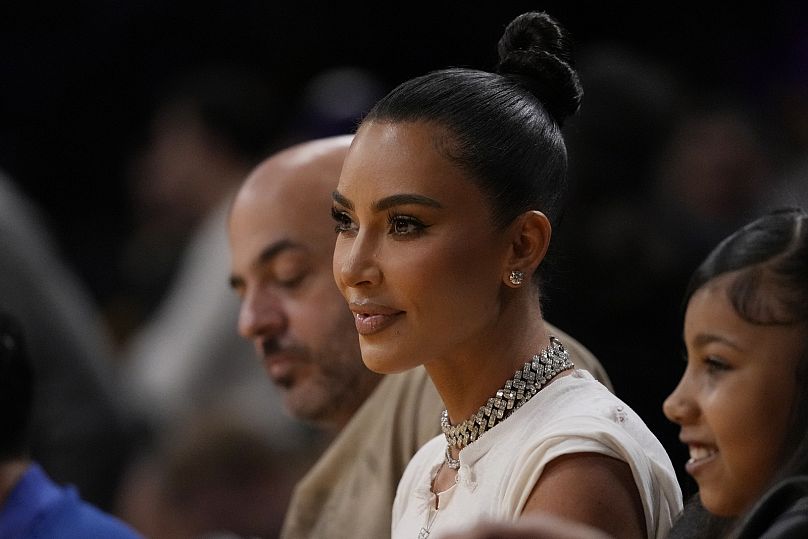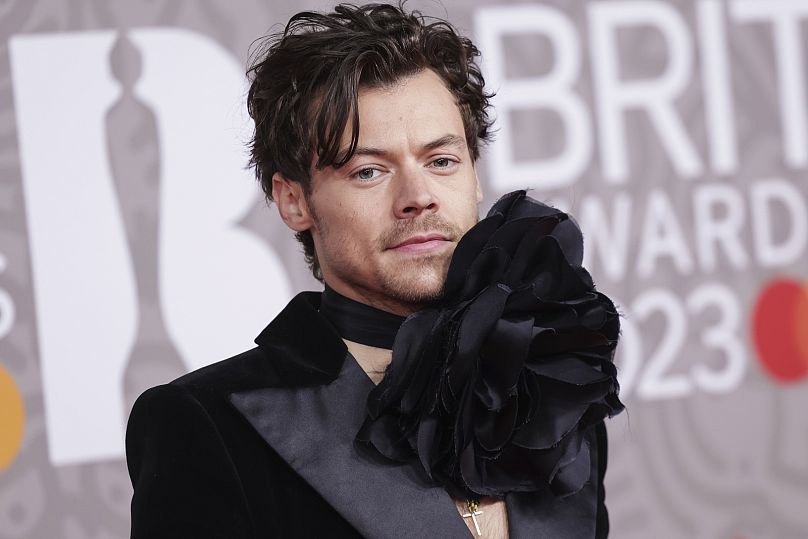
By Andrea Carlo • Updated: 30/06/2023 -
Euronews Culture takes a look at the queer cultural practices and linguistic traditions which have influenced our everyday ways of living, speaking, and thinking.
Following centuries of oppression and marginalisation, Europe’s LGBTQ+ community is finally starting to receive both legal recognition and societal acceptance, with Pride parades and events having become an integral part of our yearly calendars.
As a result of such oppression, queer individuals came to create tight-knit communities with rich and diverse subcultures, that would subsequently come to both influence and be co-opted by mainstream society.
Now that Pride month draws to a close, Euronews Culture dives into the different queer-rooted cultural practices, traditions and linguistic expressions which have impacted our everyday ways of speaking, dressing, thinking, and living in its entirety.
From "slay" to "camp": our pink-hued lexicon
Ever accused someone of "throwing shade"? Or thought something looked "camp"?
Without realising it, you may have been using terms and expressions that have a queer-specific history.
Our everyday parlance is imbued with expressions, terms and idioms that were developed within LGBTQ+ communities. For starters, a lot of the present-day slang stereotypically associated with Generation Z (teenagers and young adults born from the mid-late 1990s to circa 2010) was inherited from the jargon of New York City’s ballroom and drag communities, which were birthed by queer people of colour. Think of "slay", "snatched", "wig" – interjections typically used to express enthusiasm or approval – which are now adopted in everyday contexts by many individuals who have no connection to the queer community.
Pioneering American drag queen RuPaul's reality show -- RuPaul's Drag Race -- which debuted in 2009 and has become a global franchise, is often credited as having exposed the public to such terminology. In 1990, documentary Paris is Burning, which delved into NYC's ball rooms, also contributed to growing public awareness of queer subcultures.
Speaking to Euronews Culture, Ricky Tucker -- a prominent NYC-based culture critic -- remarked on the extent to which English slang has picked up words from the Big Apple's queer subcultures.
"[The lexicon of] ballroom is thriving across the world, but ballroom is still underground," he stated. "The etymology of the words themselves is often hard to figure out" -- Tucker remarked on how certain expressions, namely "throwing shade", may have originated outside of the ball and drag community -- "so you've got to see the context in which they're most commonly used."

RuPaul
NICK HOOVER/AP2006
But, “pink language”, so to speak, is not just a by-product of US-based queer subcultures. In the UK, many expressions such as "naff" (bad) and "camp" (kitschy) came from or were associated with 'Polari', a sociolect which developed in Victorian London’s disenfranchised gay and travelling communities, that used words of Cockney, Romance, Yiddish and Romani origin ('Polari' itself derives from the Italian word parlare, "to speak").
'Polari' was queer argot that, while not exclusive to the community, was used to communicate at a time in which being gay was tantamount to a social death sentence – and often a criminal one too. It was only the popular 1965-1968 BBC Radio show Round the Horne which would come to introduce certain Polari expressions to a mainstream UK public.
Paul Baker, a scholar looking at the history of 'Polari', noted its spill-over into mainstream British English vocabulary, although he believes its influence is somewhat less wide-ranging than the US's ballroom lexicon.
"[I]t's only really a very small number of Polari words that made it into the mainstream, and in some cases this was temporary," he told Euronews Culture. "Some of the words which have survived the test of time were only peripherally Polari, but were words more generally associated with the gay community (words like camp or trade)."
"The forms of language used by queer folk in the US have been more influential on the mainstream," he added. "So RuPaul’s Drag Race has helped to make some forms of vocabulary more common."
From pop music to makeup: how queer subcultures changed our cultural landscape
Throughout the centuries, queer individuals -- often shunned from their domestic lives -- forged new families and found greater acceptance within more liberal-minded, bohemian circles.
It comes as little surprise that what we describe as "queer" culture would come to be intimately intertwined with the world of theatre, fashion and the arts, and that it would consequently exert an indelible influence
But, “pink language”, so to speak, is not just a by-product of US-based queer subcultures. In the UK, many expressions such as "naff" (bad) and "camp" (kitschy) came from or were associated with 'Polari', a sociolect which developed in Victorian London’s disenfranchised gay and travelling communities, that used words of Cockney, Romance, Yiddish and Romani origin ('Polari' itself derives from the Italian word parlare, "to speak").
'Polari' was queer argot that, while not exclusive to the community, was used to communicate at a time in which being gay was tantamount to a social death sentence – and often a criminal one too. It was only the popular 1965-1968 BBC Radio show Round the Horne which would come to introduce certain Polari expressions to a mainstream UK public.
Paul Baker, a scholar looking at the history of 'Polari', noted its spill-over into mainstream British English vocabulary, although he believes its influence is somewhat less wide-ranging than the US's ballroom lexicon.
"[I]t's only really a very small number of Polari words that made it into the mainstream, and in some cases this was temporary," he told Euronews Culture. "Some of the words which have survived the test of time were only peripherally Polari, but were words more generally associated with the gay community (words like camp or trade)."
"The forms of language used by queer folk in the US have been more influential on the mainstream," he added. "So RuPaul’s Drag Race has helped to make some forms of vocabulary more common."
From pop music to makeup: how queer subcultures changed our cultural landscape
Throughout the centuries, queer individuals -- often shunned from their domestic lives -- forged new families and found greater acceptance within more liberal-minded, bohemian circles.
It comes as little surprise that what we describe as "queer" culture would come to be intimately intertwined with the world of theatre, fashion and the arts, and that it would consequently exert an indelible influence

Celebrity Kim Kardashian is often credited with having 'popularised' the contouring makeup trend
Ashley Landis/Copyright 2023 The AP. All rights reserved
This influence traces a long history, ranging from the "traditionally" masculine 1920s Garçonne style which was associated with lesbian women, to the colourful, free-flowing fashions of the 1970s and dramatic looks of 1980s New Wave rockers. To this day, many makeup trends that had become inescapable by the mid-2010s – namely that of "contouring", or using different foundation hues to dramatically accentuate cheekbones and other facial features – drew direct inspiration from the styles used by drag queens, and was widely popularised by the Kardashian-Jenner sisters and their reality show.
The footprint left by the queer community is not limited to the realm of everyday aesthetics, but sonics too. Much of the music that surrounds us and is blasted on a daily basis from clubs to shopping centres, has its origins in queer subcultures -- most prominently, disco and house, the former of which developed in 1970s NYC, and the latter in the 1990s.
Since the start of the new decade, and in particular in the midst of the COVID-19 pandemic, disco's glitzy, upbeat sound has witnessed a resurgence, especially as people seek a musical distraction from the hardships of everyday life.
British-Kosovar pop star Dua Lipa's hit 2020 album Future Nostalgia is often seen as the herald of this new trend, as a shimmery, unabashedly dance-heavy record released in the midst of a minimalist indie and trap-dominated landscape. Indeed, this year's highly anticipated Barbie movie, directed by Greta Gershwin and starring Margot Robbie and Ryan Gosling, has a soundtrack replete with disco flavours, starting from Lipa's own "Dance the Night" track.
This influence traces a long history, ranging from the "traditionally" masculine 1920s Garçonne style which was associated with lesbian women, to the colourful, free-flowing fashions of the 1970s and dramatic looks of 1980s New Wave rockers. To this day, many makeup trends that had become inescapable by the mid-2010s – namely that of "contouring", or using different foundation hues to dramatically accentuate cheekbones and other facial features – drew direct inspiration from the styles used by drag queens, and was widely popularised by the Kardashian-Jenner sisters and their reality show.
The footprint left by the queer community is not limited to the realm of everyday aesthetics, but sonics too. Much of the music that surrounds us and is blasted on a daily basis from clubs to shopping centres, has its origins in queer subcultures -- most prominently, disco and house, the former of which developed in 1970s NYC, and the latter in the 1990s.
Since the start of the new decade, and in particular in the midst of the COVID-19 pandemic, disco's glitzy, upbeat sound has witnessed a resurgence, especially as people seek a musical distraction from the hardships of everyday life.
British-Kosovar pop star Dua Lipa's hit 2020 album Future Nostalgia is often seen as the herald of this new trend, as a shimmery, unabashedly dance-heavy record released in the midst of a minimalist indie and trap-dominated landscape. Indeed, this year's highly anticipated Barbie movie, directed by Greta Gershwin and starring Margot Robbie and Ryan Gosling, has a soundtrack replete with disco flavours, starting from Lipa's own "Dance the Night" track.
'Queerbaiting': influence or appropriation?
The impact which the LGBTQ+ community has had on mainstream pop culture is undeniable. But things may not be so rosy: has queer culture influenced our popular trends, or has it been appropriated?
Part of the trouble boils down to the crux of the question: what is queer culture, and does it exist in a clearly identifiable form?
Indeed, what is read as “queer” may change in a specific time and place. Crossdressing for entertainment purposes, for instance, has been a part of “straight” working-class pub culture in the UK, for instance, while men’s fashions in the 18th century — where aristocrats donned puffy wigs and heavy makeup — would be perceived as “androgynous” and “queer” by many within a contemporary, Western social context.
The trouble comes when, in a highly politicised environment in which LGBTQ+ rights are highly fragile, the adoption of specific components of LGBTQ+ culture may have a loaded meaning.

British pop star Harry Styles has been accused by some of "queerbaiting"
Vianney Le Caer/2023 Invision
Certain artists such as Harry Styles and Charlie Puth, who have recently adopted more androgynous clothing styles and who have also not come out as LGBTQ+, have been accused by some of “gaybaiting” or “queerbaiting”: that is, appropriating a specific style or set of mannerisms to appeal to and profit off of their LGBTQ+ fanbase, while not enduring the social oppression that comes with being publicly queer.
The issue becomes even more polemical when celebrities such as Styles and Puth get praised for their gender-bending and “rule-breaking” fashions, while drag queens and trans individuals are finding their rights stripped and attacked left, right and centre, especially as many US states pass anti-drag bills.
“Gaybaiting is a thing,” Tucker asserted, noting that the relationship between mainstream pop culture and queer subcultures is “complicated, paradoxical, and complex”.
As for why mainstream culture co-opts "queer" styles? "People who are put upon are generally seen as cool, and hip," he remarked. "And queer — and particularly Black queer — people are the most put upon in the US."
"Anything that's hip and spreads the world and catches fire," Tucker quipped, "can generally be tracked back to a queer man of colour."
Tucker took the example of Madonna’s iconic 1990 "Vogue" music video, which brought the ballroom dance style to the masses. But, as he noted, the song’s memorable bridge — in which she references a slew of Golden Age Hollywood stars — has no real connection to the spirit of ballroom.
Certain artists such as Harry Styles and Charlie Puth, who have recently adopted more androgynous clothing styles and who have also not come out as LGBTQ+, have been accused by some of “gaybaiting” or “queerbaiting”: that is, appropriating a specific style or set of mannerisms to appeal to and profit off of their LGBTQ+ fanbase, while not enduring the social oppression that comes with being publicly queer.
The issue becomes even more polemical when celebrities such as Styles and Puth get praised for their gender-bending and “rule-breaking” fashions, while drag queens and trans individuals are finding their rights stripped and attacked left, right and centre, especially as many US states pass anti-drag bills.
“Gaybaiting is a thing,” Tucker asserted, noting that the relationship between mainstream pop culture and queer subcultures is “complicated, paradoxical, and complex”.
As for why mainstream culture co-opts "queer" styles? "People who are put upon are generally seen as cool, and hip," he remarked. "And queer — and particularly Black queer — people are the most put upon in the US."
"Anything that's hip and spreads the world and catches fire," Tucker quipped, "can generally be tracked back to a queer man of colour."
Tucker took the example of Madonna’s iconic 1990 "Vogue" music video, which brought the ballroom dance style to the masses. But, as he noted, the song’s memorable bridge — in which she references a slew of Golden Age Hollywood stars — has no real connection to the spirit of ballroom.
Moreover, to make matters worse, many people erroneously see "voguing" as the Queen of Pop's creation, thus divorcing the dancing style from its rich cultural background.
While the public’s often lazy approach to referencing cultural practices from marginalised communities may be considered problematic in today's social milieu, some see the matter as a relative non-issue, arguing that community has "ownership" over a particular cultural practice, especially given queer culture’s own fluidity.
Professor Matt Cook, recently appointed the first LGBTQ+ history professor at the University of Oxford, considers the talk of “queerbaiting” to be a red — or, rather, pink — herring distracting from the real issue at hand: the ongoing political ambushes gnawing at LGBTQ+ rights and equality.
"I’m resistant to the idea of there being a ‘straight’ way of acting," he told Euronews Culture. "I celebrate anyone who is exploring different ways of expressing themselves."
"Of course we should question people's behaviours, but what is the real problem here?" he added.
And on the issue of the politicisation and criminalisation of drag culture?
"The right is trying to foment a culture war," he stated. "We don’t address that by critiquing people like Harry Styles."
No comments:
Post a Comment